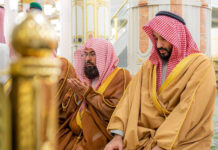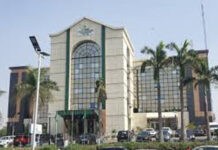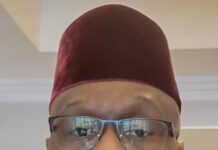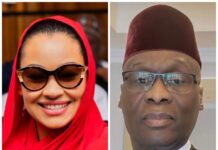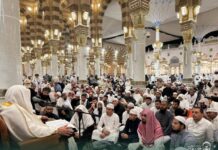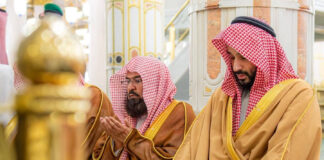RIYADH: The King Salman Global Academy for Arabic Language concluded the Harf Arabic Language competition on Monday with 12 winners in four categories from various non-Arabic speaking states.
The competition, launched May 4, is aimed at non-Arabic learners to give them the opportunity to highlight their skills in various fields, to honor the distinguished among them, and to encourage learners to practice the language and promote its use.
The winners were honored after being selected according to the approved criteria during the closing ceremony, held in Riyadh, which saw the participation of more than 750 contestants, representing a number of Saudi universities and institutes, with 56 people reaching the final stage.
READ ALSO: Saudi Heritage Commission announces discovery of earliest Arabic inscription
Dr. Abdullah bin Saleh Al-Washmi, acting secretary-general of the academy, said: “Saudi Arabia’s wise leadership always encourage(s) the non-native Arabic learners to practice and use it.
“The competition contributed to achieving the academy’s goals and implementing its strategy by creating the appropriate environment for the development and consolidation of the Arabic language,” he added.
The competition is aimed at non-Arabic learners to give them the opportunity to highlight their skills in various fields
“The competition aims to encourage the Arabic language scholars, researchers and specialists by developing the professional, linguistic and cultural competencies of Arabic language teachers for non-Arabic speakers, motivating them and creating solutions that support the empowerment of non-Arabic speakers in various challenges they face.”
The academy awarded prizes to the first three winners in each category, with a total value of SR100,000 ($26,666) and honored other finalists with financial prizes totaling SR22,000.
Musa Yaqoub from Cameroon, Umm Al-Qura University, ranked first in the Lexical Ability category; Abdul Rahman Ali Cham from Gambia, Majmaah University, ranked second, and third place was taken by Ibrahim Othman Kalo from the Ivory Coast, Umm Al-Qura University.

The three winners in the Language and Technology category were Zakaria Sirin, from Indonesia, King Saud University, Reem Reforce, from the Philippines, Umm Al-Qura University, and Zehniaa Saleh from the Philippines, Princess Nourah bint Abdulrahman University.
The winners in the Narrator and Stories category were Khaled Safi from Afghanistan, Umm Al-Qura University, Qanitah Sheikh from India, Umm Al-Qura University, Mariam Mahdi Mirato from the Philippines, Princess Nourah bint Abdulrahman University.
The winners in the Research Paper category were Mohammed Sako from Guinea, Qassim University, Medina Jalis Khannova from Russia, Princess Nourah bint Abdulrahman University, and Effaa Abdullah from India, Princess Nourah bint Abdulrahman University.
The participants represented more than 60 nationalities. India ranked first in terms of the number of participants with 73 contestants, then Indonesia and Afghanistan with 42 contestants each, then Ivory Coast with 38 contestants, Burkina Faso with 37 contestants, Nigeria with 34 contestants, Guinea, Gambia and Chad, with 32 contestants apiece, while Mali had 30 contestants.

